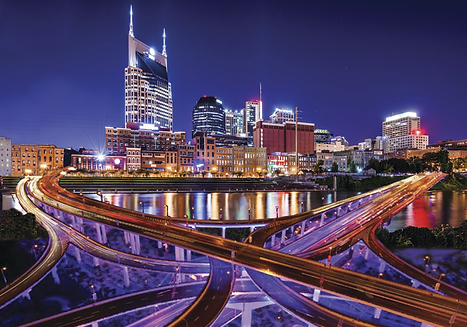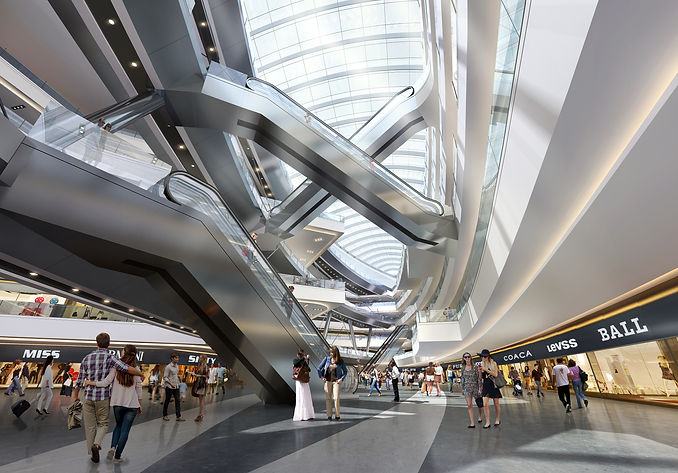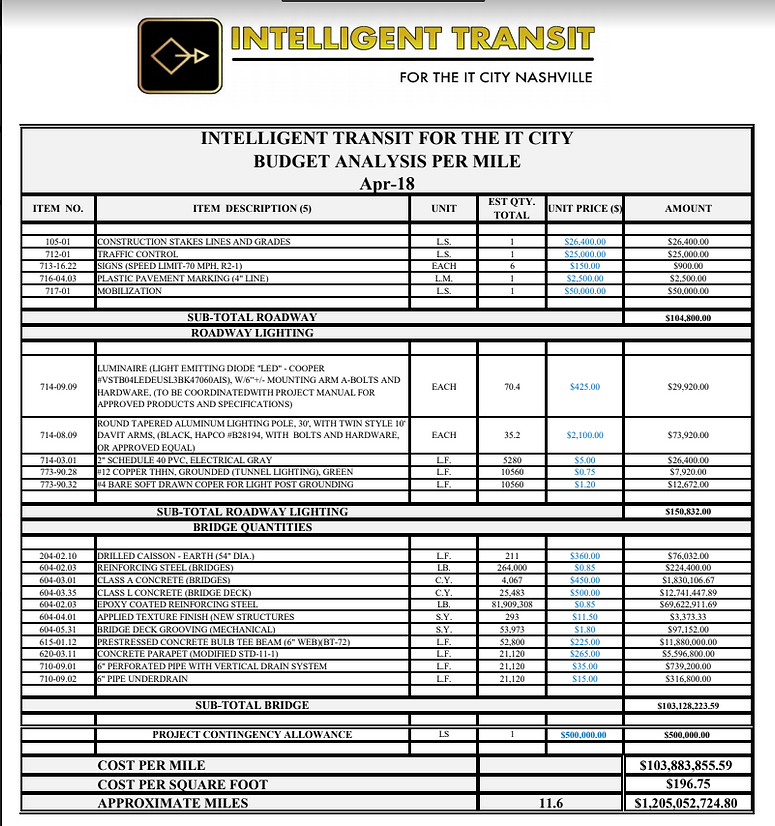

An Alternative Plan to Solving Nashville’s Transportation Crisis
Unveiled on April 10th by Nashville Metro Councilman Robert Swope and dubbed "Intelligent Transit for the It City Nashville,” the plan is centered around a fleet of autonomous vehicles (AV) operating along major freeway corridors connecting 10 Middle Tennessee counties, moving Music City Central terminal, and the construction of double-decker highways, within the next three to five years.“
The future is now. We can be the city driving the entire country forward with the model for a modern, environmentally clean, efficient, and effective transportation ecosystem. One that reduces traffic, creates more usage green space, values the health, welfare and safety of all our constituents and, most importantly, enables total transportation equality and independence above all else,” said Councilman Swope at the press conference in Nashville.

Rethinking Transit For The Future
Key guiding principles of the Intelligent Transit plan:

#1
#2
#3
Mass transit and personal transit are complementary elements rather than separate transportation options.
A transportation plan needs to be based on regional needs rather than an individual county need.
We must look at creating equitable and independent mobility by taking into account existing mass transit options and future technologies.
The Intelligent Transit Plan
The Intelligent Transit Plan encompasses the entire Middle Tennessee region, with 10 counties working together as one. Planned, are 16 regional autonomous vehicle transit centers and 18 municipal transit centers, resulting in trips from Murfreesboro to downtown Nashville in less than 30 minutes, any time of day.

Map of proposed Transit Terminals
Step 1- The Personal Autonomous Electric Vehicle
* Autonomous/Electric transit vehicles will operate within an autonomous transportation environment, and Personal autonomous/electric vehicles will provide last-mile/first-mile options. All will be managed through MTA and RTA.
* NextGEN Autonomous Electric Commuter Vehicles (AV/EV's)– a blend between buses and trains – will provide service 24/7/365 with 15 minute scheduled runs during peak hours in the morning and evening and one-hour service during the remaining parts of the day. These commuter options will run on dedicated autonomous vehicle lanes along the inside medians of freeways.
* Smaller (12m) Autonomous Electric Vehicles (AV/EVs) will operate within dedicated autonomous vehicle lanes along all major pikes. The only infrastructure additions will be “passing positions” where the center lane is widened just 8 feet for a length of 50 feet only every 10 blocks to enable AV/EVs running in opposite directions to pass one another.
* Personal Autonomous Electric transit options will be created as a public-private partnership with a corporate fleet service operator. Personal Transit Vehicles on demand will pick people up at their homes and deliver them to the nearest transit center for a minimal fee estimated at 40 cents a mile.


NextGEN Autonomous Electric Vehicles
NextGEN Autonomous Electric Vehicles
Step 2- A New Music City Central
Our plan is to move the Music City Central main terminal to the current PCS Metals facility just south of the stadium. We will work with MTA and RTA to create a holistic, 100% environmentally clean transit grid. Routes developed in our plan will drastically reduce traffic.

Current plans for the new terminal will be a crowning jewel on Music City with shopping, dining and meeting spaces convenient to riders. The IT Nashville plan also includes wireless, environmentally clean charging stations enable the system to run 24/7/365. Vehicles never need to stop to recharge; they charge as they operate.

Image represents new MTA Terminal as outlined in Intelligent Transit Plan.

Image represents new MTA Terminal as outlined in Intelligent Transit Plan.
Step 3- Redesigned Freeway System

Traffic Benefits
Stacked
Freeway System
It is estimated that over 35% of the traffic on downtown core freeways is traffic that passes through Davidson County on route to other destinations.
To deal with the 35% of the downtown traffic that passes through Nashville without stopping, our solution is to double stack areas of I-65, I-40 and I-24, with the help of the federal government and the State of Tennessee.

With the highest investment in the proposed plan, stacked highways prove they are worth the cost and provide solutions for the foreseeable future. Aids the number of vehicles traveling to and from downtown, especially during peak travel hours. (Currently 50% of traffic congestion comes from surrounding counties.) Saves billions of dollars when compared to other proposed plans.


Image represents new MTA Terminal as outlined in Intelligent Transit Plan as well as the stacked freeway system.
Advantages of The Intelligent Transit Plan
-
Reduces the number of vehicles traveling to and from downtown, especially during peak travel hours. (Currently 50% of traffic congestion comes from surrounding counties.)Saves billions of dollars when compared to other proposed plans.
-
NextGEN autonomous vehicles (AVs) are smooth, sleek, comfortable and affordable.
-
NextGEN AVs are beautiful and comfortable, will offer free wireless and will cost less than one half of the price Nashville currently pays for its electric buses.
-
AVs need little or no costly infrastructure to operate, only re-striping of the highways and possibly minor barrier additions. No need to expand existing roadways as light rail does.
-
With no fixed infrastructure to physically move, routes can be altered very quickly when needed as and when community needs change in the future.
-
AVs know where they are, where all other AVs are and respond accordingly in a fraction of the time and physical space that human drivers require.
-
Equality and independence in transit become reality for everyone in 2-5 years. Even Access Riders will have greater mobility, far quicker and at a fraction of the costs they currently incur.
-
The new Music City Central Terminal will become an iconic destination for Nashville much like Union Station and Grand Central Terminal. It will weave culture, art, retail and music into the urban fabric that is uniquely Nashville. Moving it to a better location means it can be delivered in a fraction of the time and at less than 20% of the proposed cost in the Lets Move Nashville plan.
-
The technology to implement this plan with autonomous vehicles is available now and will be implemented not in 12 years but within the next 12 months!
The Numbers
-
The entire Intelligent Transit Plan can be funded through a modern Public Private Partnership (P3). It includes private equity funding, working together with municipal, state and federal governments for funding in a 25% private, 25% municipal, 50% state and federally shared program.
-
Total cost $1.65 billion: $400 million in private investment, $150 million from the State of Tennessee, $700 million from the federal government, and $400 million from Nashville (a fraction more than Nashville may spend on a new soccer stadium).
The single most expensive element of the Intelligent Transit plan is double stacking the freeways. To that end, here is the engineering cost estimate for doing so:


The Intelligent Transit for Nashville plan is simply an alternative proposal offered to create and stimulate thought for all who live, work and play in Nashville.
WE ARE NOT ASKING FOR A VOTE. WE ARE NOT REQUESTING A TAX INCREASE. WE ARE SIMPLY OFFERING AN ALTERNATIVE PLAN FOR YOUR COLLECTIVE CONSIDERATION.